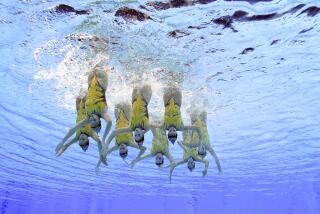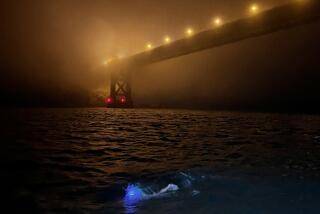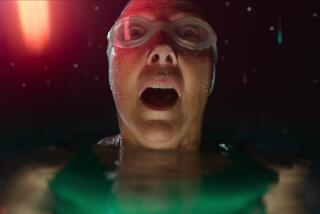DEEP STROKE : Cox Is Back in U.S.S.R. to Attempt to Make It Across Cold Lake Baikal
- Share via
Lynne Cox will proceed from Frankfurt, West Germany, to Moscow Thursday en route to Siberia for an attempt to swim Lake Baikal, the world’s deepest lake.
The Los Alamitos woman, who swam the Bering Strait from U.S. to Soviet soil a year ago, has been doing cold-water training in Austria the past week--although the water at Hallstatter Lake near the Austrian town of Obertraun hasn’t been as cold as she had hoped.
“It’s been as high as 68 and only as low as 65, but it’s the best we can do,” she said by phone from Austria.
She expects Baikal to be no warmer than 50 degrees, although information is scant.
After a news conference for Soviet reporters in Moscow, the Soviets will transport her and a five-person support team some 2,600 miles east to Irkutsk near Baikal.
She would travel only about two-thirds as far going west, but Cox, 31, doesn’t tend to do things the easy way. Besides, she had to stop in Moscow.
When she left home, she was about $80,000 short of her original $106,000 budget, which she hoped would include extensive training in cold-water locales.
“It’s been cut substantially,” she said. “We can’t have any disasters.”
Cox has been frustrated by an inability to gain significant financial support from major U.S. corporations.
The newspaper Sovietskaya Kultura said last weekend that Cox had “established a symbolic bridge of friendship” with her swim from the United States to the Soviet Union and hoped the same would be done at Baikal.
“We wish her success,” the newspaper said.
Last year’s feat was reported in newspapers and on television throughout the Soviet Union, and when Cox was in Moscow working on arrangements earlier this summer, she was recognized on the streets and treated like a celebrity.
“People ask me, ‘Why isn’t corporate America doing something?’ ” she said. “I don’t know. (Soviet leader Mikhail) Gorbachev toasts you at a White House banquet and that doesn’t mean anything?”
At least this time she left home confident that the Soviets knew she was coming. A year ago she didn’t receive permission to land on Big Diomede Island until the day before her attempt, compounding her usual money problems with political concerns--not a good way to keep her mind focused on the effort.
“You do what you have to do with what you have,” she said. “This is part of it. It’s a mountain you have to climb, and the swim is the summit. As the swims become more difficult, so do the logistics.
“It completely wipes you out sometimes, but if you’re an endurance athlete, you keep going. You go through ups and downs all the time.
“But then someone calls up out of the blue and says, ‘We’d like to contribute $5,000 because we believe in what you’re doing.’ ”
That was a Huntington Beach company that makes filing labels--and Cox talked them up to $10,000.
A West German airline is flying her between home and Moscow, and smaller local businesses have helped, along with many individuals.
“A guy in San Francisco who is handicapped sends what must be half his income,” Cox said. “A man in Leisure World sends $5. Every day people keep sending in a few dollars. It’s really nice, and at the same time it increases the pressure of responsibility I feel toward those who are supporting me.”
The date of the swim depends on weather--and, perhaps, the whim of the Soviets, who are seeking maximum exposure to further Gorbachev’s glasnost goals.
Lake Baikal, 60 miles north of the Mongolian border, has not been on the usual tourist track. The lake contains one-fifth of the fresh water in the world and presents potentially formidable conditions of cold water and high winds.
Cox had hoped glacier-fed Hallstatter Lake would give her medical handlers an opportunity to monitor her reactions for reference during the Baikal attempt.
In a recent training exercise at Portage Glacier in Alaska, she swam in 35-degree water for nine minutes “to find the outer limits,” she said.
She found that dropping from 38 degrees--the low point near the end of her 2-hour 5-minute Bering swim--to 35 multiplies the effects by degrees.
“My fingers and toes were very cold, but when they took my temperature afterward it had gone up two degrees,” she said. “Something is happening to take care of me in cold water.”
She has an entirely new support team this time. After the Bering feat, there was a falling-out with project director Joe Coplan of New York, and doctors William Keatinge of London and Jan Nyboer of Anchorage were unavailable to assist this time.
The new team:
Dr. Gabriella Miotto, 30, a UC Irvine Medical Center resident who has done research in hypothermia.
Peter Kassander, 40, of Washington D.C., a Russian-speaking specialist in Soviet affairs on loan from the Goodwill Games organization.
Sandy Field, 32, of Long Beach, an experienced distance swimmer who will serve as medical assistant.
Philip Monteleone, 34, a Long Beach banker and distance swimmer who is coordinating fund-raising and logistics.
Ross Roseman, 31, a pilot from Seattle and high school swimming teammate of Cox who will serve as navigator on the swim.
“I think it’s going to work better,” Cox said. “The people this time have been in it for three or four months, whereas the last time we all just kind of met in Alaska.”
Her original plan was to do a series of swims, but the Soviets suggested she settle for one.
“At first I was disappointed that it was all I was going to do,” she said, “but this way it’s more focused. Also, it’s going to be more difficult than I thought it would be.”
She expects the swim to take between 4 and 10 hours--a wide variable because of so many unknown factors. Sovietskaya Kultura said no swimmer has ever attempted to cross Baikal.
The crescent-shaped lake is 5,315 feet deep, 1,493 feet above sea level and 380 miles long, and its width varies between 14 and 48 miles.
Sovietskaya Kultura said Cox would start from Lichvenichnoye, a village so small it is not in the Soviet atlas.
But Cox said, “The sites where we’ll start and finish won’t be determined until we’ve looked it over. I’d just like to make it across at this point.”
More to Read
Sign up for Essential California
The most important California stories and recommendations in your inbox every morning.
You may occasionally receive promotional content from the Los Angeles Times.













